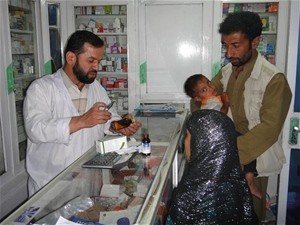
Pharmacist Hasham provides medication counseling to parents for their sick child.
USAID/SPS
Pharmacists received little capacity building interventions during the rebuilding of Afghanistan’s health sector
19 JUNE 2011 | KABUL, AFGHANISTAN
The Ministry of Public Health maintains 53 pharmacy stores, which are managed by 118 pharmacists. These government operated pharmacies are often the first source of contact for low-income patients. However, a number of challenges need to be overcome in order to provide quality patient care including poor dispensing practices and record keeping, insufficient knowledge of medicines listed in Afghanistan Essential Drug List and Licensed Drug List, weak communication with patients concerning their medications, and avoidance of dialogue with doctors to clarify prescriptions regarding dose and duration.
Impressed with the training on rational use of medicines he received through a USAID project, Dr. Mirza Ayoobi, the deputy director of Pharmaceutical Enterprises wanted to upgrade his pharmacists’ knowledge and skills on dispensing and rational use of medicines.
In April 2011, the first group of 32 pharmacists received training on good dispensing practices, patient communication, and pharmaceutical management principles supported with interactive case studies. The pharmacists were also educated about the threat of antimicrobial resistance and their role in mitigating risk. During the dispensing process, if a patient does not understand the dose and duration of medicines especially antibiotics, it may result in antimicrobial resistance.
"For many years after my graduation, I had no opportunity for continuing education. We have turned into "shopkeepers," as they say, said Mohammad Hasham, a pharmacist at the Khairkhana 102-bed hospital. "Fortunately, USAID facilitated this opportunity to learn new things and raise our professional level and competency. It is now our duty to properly communicate with patients and ensure that they understand how to take their medicines."







Comment
Make a general inquiry or suggest an improvement.